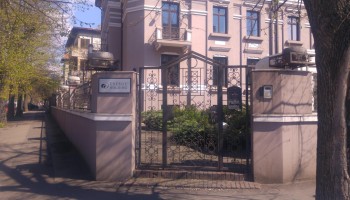The government project was intended to safely dispose of cancer-causing chemicals stored near Kalush, a city of 67,600 people on the Limnytsia River, a tributary of the Dniester.
The chemicals, a byproduct of the region’s potash mining, have been accumulating for nearly 30 years. Environmentalists say this toxic brew includes the known carcinogen hexachlorobenzene or HCB.
S. I. Consort has declared that the area was successfully cleaned up, a claim backed up by Ukraine’s Ministry of Ecology and Natural Resources. However, no test results have been released that would prove this assertion.
But independent tests completed in 2014 and paid for by the Organized Crime and Corruption Reporting Project (OCCRP) found levels of HCB contamination several thousand times the legal limit—raising the question of what, exactly, S.I. Consort did to clean up the hazardous waste in Kalush.
Back in 1976, a large amount of HCB-tainted sludge – exactly how much is a matter of dispute – was stored in a “polygon,” a massive hole dug specifically to safely store toxic materials. It was this contaminated sludge that S.I. Consort was paid to remove, a job company officials insist they have done properly.
Environmentalists and the Ecology Ministry, however, say the job was done poorly, leaving behind chemicals that might leach into groundwater and tributaries of the Dniester River, imperiling the water supply used by 10 million people in western Ukraine and Moldova.
Israeli Cleaners
The company doing the cleaning has been mired in controversy during its work in Ukraine. S.I. Group Consort Ltd. was founded on Oct. 5, 2008, by Israeli businessman Yehiam Jack Avissar, who today is the company’s director. Israeli Ilya Marchevskiy currently owns 77.5 percent of the company, with Avissar having a share of 15 percent with the rest (7.5 percent) belonging to Israeli lawyer Assaf Cohen.
In January 2011, a court in Tel Aviv found Marchevskiy guilty of tax evasion and sentenced him to seven months in jail, which was later reduced to three months community service by the Israeli Supreme Court.
The tax evasion occurred in 2002-2003 when Marchevskiy was the owner and director, together with Vladimir Libman, of a lumber-importing company in Israel called Yavits Finance International Ltd. The company went bankrupt and Marchevskiy left it, but failed to submit the necessary tax reports or pay its debts to the tax authorities, according to the legal department of the Israeli Tax Authority, which filed the case.
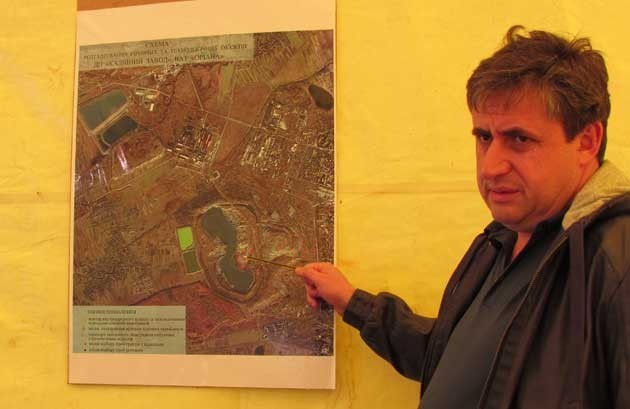 Ilya Marchevskiy (photo: courtesy vikna.if.ua)“The defendant chose to renounce his obligations as a director of the company… he left a company mired in debt and (evaded) all responsibility for it,” the verdict said.
Ilya Marchevskiy (photo: courtesy vikna.if.ua)“The defendant chose to renounce his obligations as a director of the company… he left a company mired in debt and (evaded) all responsibility for it,” the verdict said.
In January and February of 2012, Marchevskiy repeatedly tried to suspend the execution of the sentence at the Supreme Court, on the grounds that he was needed to fulfill the contract to remove waste in Ukraine. The court denied his request.
In September 2013, Ukrainian police launched a criminal investigation into Si Bud Sistem, the Ukraine-registered subcontractor of the Israeli cleaner, fully owned by Marchevskiy, on the grounds that it was overcharging for its services.
Police suspected that the Ukrainian subcontractor “falsified documents on waste shipment,” and gave “untruthful” information on the actual volume of waste it transported.
The Toxic Sludge They Said They Removed
In early 2014, Ukraine’s State Ecological Inspection reported that 33.5 thousand tons of soil had been collected, stored and exported from the Kalush site between 2010 and 2013. The percentage of HCB in the soil was reported to be 50 percent.
In January 2014, the Ministry of Ecology declared the cleanup to be a success, noting the soil in Kalush was undergoing testing by the Institute of Environmental Geochemistry of Ukraine (IEG), which collected 14 soil samples to check for HCB.
The Ministry of Ecology promised to announce the results in a month, but has never done so.
In August 2014, reporters for OCCRP sent two samples of Kalush soil from the polygon to the Laboratory of Quality and Safety of Agricultural Products for analysis.
The level of HBC in the first sample was 1,856 times higher than the legal limit. The second sample exceeded the limit by 3,200 times. The samples – one kilogram of soil in each case - were taken from 30 cm depth in the areas of the polygon that were not covered with grass or water. It is not clear if the waste was not cleaned up in the first place or if the polygon is leaking. Officials at the Ecology Ministry refused to comment on the results obtained by OCCRP.
Halyna Balan, one of the specialists at the Ministry of Health’s L.I. Medved’s Research Center of Preventive Toxicology, Food and Chemical Safety in Kyiv, says such figures are unacceptable.
“If (hexa)chlorobenzene gets into the body with water, it can cause blood diseases and stimulate development of malicious tumors,” she said.
While Balan expressed skepticism of OCCRP’s results, the institute also refused to test the Kalush site itself prior to OCCRP’s testing and would not explain why on the record.
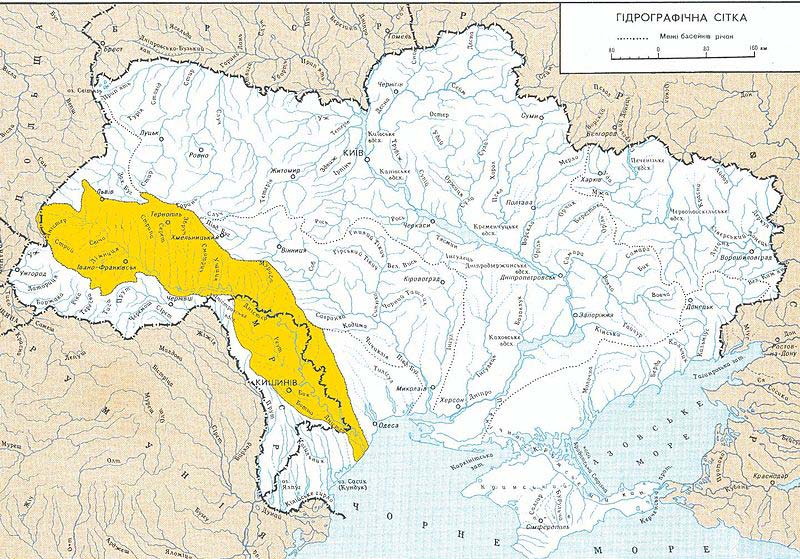 The area shaded yellow is the part of the Dniester River valley that may be poisoned. An estimated 10 million people in Ukraine and Moldova drink Dniester water.It is not clear from public records exactly what was done at the site. Records indicate that S. I. Consort was paid by the state for its work, but it never explained to the State Financial Inspection of Ivano-Frankivsk Oblast how it spent 97 percent of the money. Other independent authorities that examined the waste found that S.I. Consort appears to have misrepresented the nature of the material removed from the site.
The area shaded yellow is the part of the Dniester River valley that may be poisoned. An estimated 10 million people in Ukraine and Moldova drink Dniester water.It is not clear from public records exactly what was done at the site. Records indicate that S. I. Consort was paid by the state for its work, but it never explained to the State Financial Inspection of Ivano-Frankivsk Oblast how it spent 97 percent of the money. Other independent authorities that examined the waste found that S.I. Consort appears to have misrepresented the nature of the material removed from the site.
S.I. Consort shipped much of the waste abroad. Officials expected the waste to be heavily polluted but that wasn’t always the case. A check with the British Environment Agency, responsible for regulating major industry, waste and ecology within England, revealed that the percentage of HCB in the Kalush soil exported by S.I. Consort wasn’t 50 percent as was initially expected from preliminary tests , but on average only 14 percent.
The concentration of HCB in the soil sent to Poland was even lower, as the country’s Chief Inspector of Environmental Protection’s records showed a percentage of 1.6 percent, or almost 31 times lower than the expected amount.
Marchevskiy, the major shareholder, denied any wrongdoing and would not comment on the test results obtained by OCCRP.
“We can prove every step we took with documents and this has actually allowed S.I. Group Consort Ltd. to successfully settle all issues with law enforcement agencies,” he said.
Marchevskiy did not provide any additional documents to back up his claims.
Bad traces
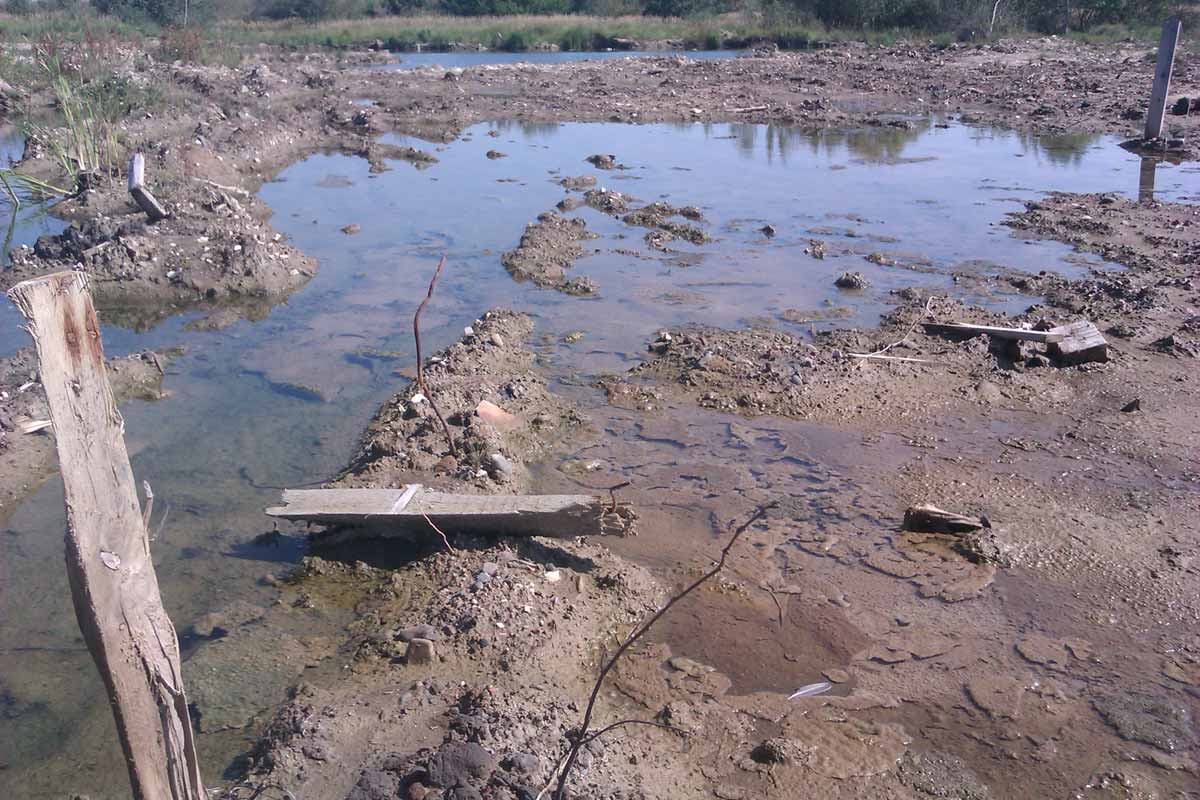 Photo by: Lyubov Velychko The polygon site today features acidic lakes 10-30 meters long and empty barrels which previously stored deadly toxic chemicals.
Photo by: Lyubov Velychko The polygon site today features acidic lakes 10-30 meters long and empty barrels which previously stored deadly toxic chemicals.
Residents of the district say they continue to collect what they believe to be potentially contaminated mushrooms and berries from the forest nearby. What they may not understand is that once HCB enters the body through air or skin contact, it spreads to all tissues and remains in the body for many years.
Many talk about a terrible cancer plague in the region. They say no authorities have ever told them that HCB can cause cancer.
“Every fourth house in the village has lost someone to cancer,” says Vasyl Shapko of Sivka-Kaluska village, which lies a few kilometers from the polygon. “My mother died six days ago from brain cancer. My cousin died from bone cancer,” he said, tears welling in his eyes.
While the 8,654 -square-mile Ivano-Frankivsk Oblast, where Kalush is located, boasts some of the lowest rates of cancer in Ukraine at 223-244 cases per 100,000 people, by contrast the city of Kalush and its immediate environs show some of the worst, at 293 cases per 100,000.
Officials at the local clinic say many residents also suffer respiratory problems.
Lidia Kharkevych, a therapist at the Kalush city medical center, sees a connection between the chemical waste and breathing problems. “Every second Kalush resident suffers from respiratory diseases: asthma, bronchitis, infections” and says she is convinced “it is connected with buried chemical waste.”
Proving that environmental toxins are causing the health problems is a very difficult process requiring extensive epidemiological testing that can take many years. There are no plans for such testing in Kalush.
Environmentalists predict the poison from the polygon will get into the groundwater of the Limnytsia and Sivka rivers, flowing into the Dniester and eventually into the Black Sea.
“The Kalush ecological problem is about to turn into a cross-border catastrophe,” says Kalush ecologist Mykhailo Dovbenchuk.
“Moldova’s authorities are deeply disturbed by the situation … (as) 80 percent of the country’s residents use water from the Dniester River. The rivers’ contamination threatens the loss of water resources and vineyard destruction. The Ministry of Ecology doesn’t realize in that case Moldova will sue Ukrainian authorities for millions of dollars,” says Dovbenchuk.
The business of waste
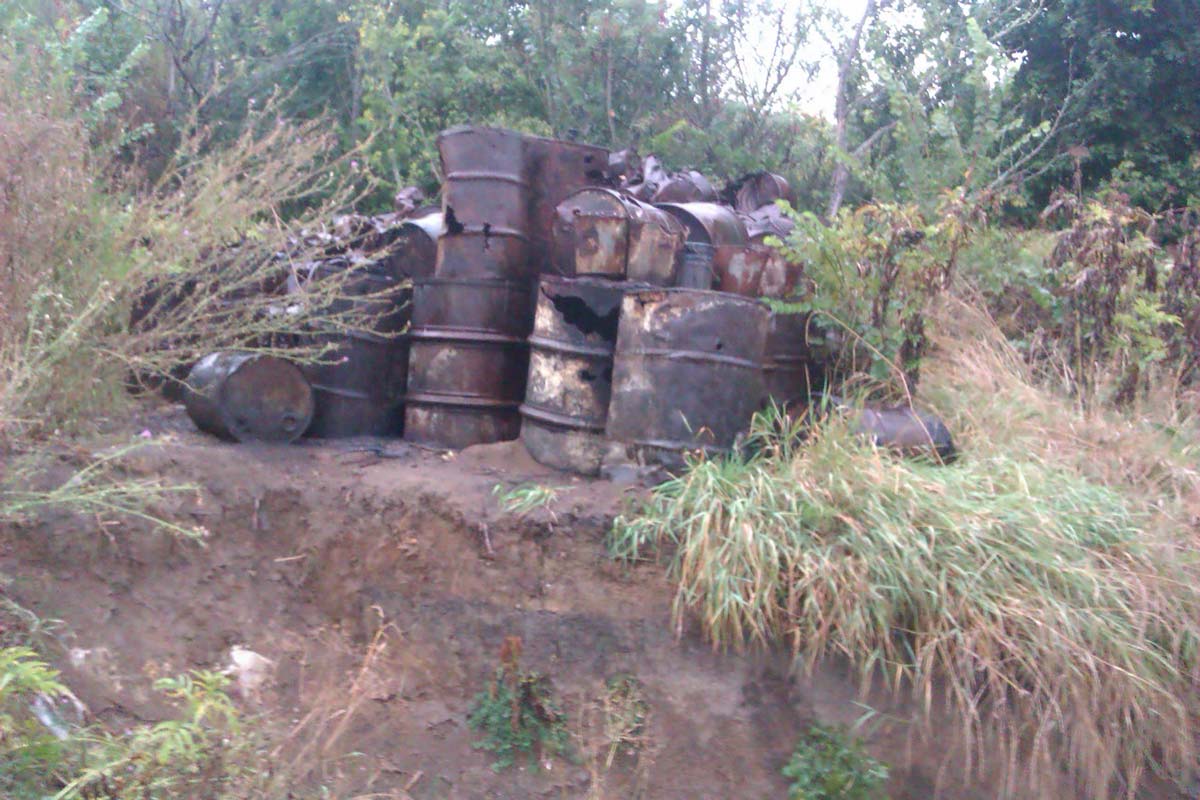 Photo by: Lyubov Velychko In 2014, the State Financial Inspection of Ivano-Frankivsk Oblast noted the company did not appear qualified to collect and export toxic waste from Kalush, as it lacked a proper license to manage hazardous waste and thus should not have won the contract.
Photo by: Lyubov Velychko In 2014, the State Financial Inspection of Ivano-Frankivsk Oblast noted the company did not appear qualified to collect and export toxic waste from Kalush, as it lacked a proper license to manage hazardous waste and thus should not have won the contract.
The company provided a statement that such a license is not required in Israel, where the company is registered.
In its response to OCCRP, the Israeli Ministry of Environmental Protection disputed that claim, saying that all parties involved in the treatment of hazardous waste are required to have a Poisons Permit and a special ministry approval if they transfer the substances to treatment facilities outside of the national site.
Instead, the report says, S.I. Consort submitted the license of a company it planned to use as a subcontractor.
On another occasion in 2011, the tender committee of Sumy Oblast State Department of Environment Protection disqualified the company’s bid, as the company failed to prove that it has equipment, employees, or prior experience in handling hazardous waste in Ukraine.
Yet despite this, S.I. Consort continued winning tenders. Some of the numbers, however, do not appear to add up.
In 2011, S.I. Consort was paid 331 million hryvnia (US$ 41.2 million) to export 9,500 tons of HCB to Poland.
According to the contract, all the waste had to be disposed of within 365 days. But S.I. Consort shipped the waste to an incinerator in Gdansk that could process only 1,000 tons of waste annually. As result, thousands of tons of poisonous waste are still stored in the plant’s vicinity, leading to charges being filed against Krzysztof Pusz, the official in charge of incinerators in Gdansk.
One year after the initial contracts were signed, politicians started asking questions.
In February 2012, lawmaker-at-the-time Yuriy Karmazin of the Ukrainian Parliament asked prosecutors to investigate what was going on with S.I. Consort and the Kalush cleanup. Although then-Deputy Prosecutor General of Ukraine Viktor Zanfirov responded affirmatively, the investigation moved slowly as the company continued to win contracts.
It wasn’t until Feb. 21, 2013, that the regional office of the main department of Ministry of Internal Affairs in Kalush initiated criminal proceedings alleging embezzlement of budgetary funds by officials of the Main Regional Development and Construction Department of Ivano-Frankivsk City State Administration, specifically involving HCB waste cleanup in the Kalush district.
As 2013 progressed, a number of other officials became interested in the Kalush situation. During the summer, Vice Prime Minister of Ukraine Yuriy Boyko ordered a number of government departments to build a factory in Ukraine to dispose of hazardous wastes, rather than spending hundreds of millions recycling toxic chemicals abroad.
In July 2013, the central executive authorities of Ivano-Frankivsk City State Administration held a joint retreat to discuss the ecological situation in Kalush. Sitting at the table with them was S.I. Consort’s Marchevskiy, who had already appeared in two criminal cases by that time.
As Marchevskiy looked on, the Ukrainian officials rejected the idea of building a factory and asked for more money for recycling HCB.
For unknown reasons, Boyko then reversed himself. Within a month, he instructed the relevant ministries to find additional funds for removal, transportation and disposal of hazardous waste from the Kalush area.
In November of 2013, S.I. Consort won another 172 million hryvnia (US$ 21.5 million) contracts.
Other contracts, other poisons
Residents and authorities of Ivano-Frankivsk Oblast are not the only ones critical of S.I. Consort. In 2012 in the Vinnytsia Oblast, the company won a 35 million hryvnia (US$ 4.3 million) contract to export waste from Europe’s largest chemical dumping ground at a landfill near Dzhuryn village which contained nearly 1,024 tons of poisonous substances, such as hexachloran, mercury, arsenic, and the notorious pesticide DDT.
The local authorities say that the Israeli firm removed only around 30 percent of the waste.
Anatoly Ishchenko, an official with Vinnytsia Oblast Ecology and Natural Resources Department, explains that the actual volume of waste turned out to be much greater than provided by the contract, since it was buried in several layers with clean soil between.
As Serhiy Honcharuk, Dzhuryn’s village head recalls, S.I. Consort left the pit containing the waste open, so that later the local officials had to cover it with soil by themselves.
In September 2014, OCCRP tested the soil from the Vinnytsia field at the Kyiv City Laboratory Center and found the DDT concentration to be three times the legal maximum.
While many residents are concerned that they may face poisoning by environmental toxins, there is little scientific data on the local situation to go on.
“No research was conducted on the chemicals affecting the health of local residents,” says Oleksandr Nagornyy, the head doctor of the Dzhuryn hospital.
Anecdotally, people say they have no doubt what is going on. “People lose their hair and suffer from cancer; livestock dies of leukemia,” says Mariya, who did not want to give her last name. She lives in Rusava, a village of about 1,200 people, located a few kilometers from the site.
According to Mykola Prodanchuk, the president of Ukrainian Toxicology Society, DDT, a pesticide banned in much of the world, can damage the immune system and cause cancer.
At least one farmer has continued growing raspberries and wheat 50 meters from the chemical burial ground, despite legal requirements for a protection zone of at least three kilometers around the site. The only way to know if the raspberries and wheat contain DDT is to have it tested. However, farmer Mykola Kuba, who owns this field, says he doesn’t have time for such nonsense.
Oleksandr Kravchuk, first deputy Chairman of the State Sanitary and Epidemiological Service of Ukraine, says in this case the responsibility for the illegal cultivation of wheat and raspberries in a sanitary zone lies on the farmer, because there is a moratorium on inspections of entrepreneurs by regulatory authorities.
Legally, “we have no right to go and see whether raspberries are being grown in the sanitary zone,” says Kravchuk. “The entire responsibility lies on the farmer. You need to contact the police and the courts.”
However, residents say they have no plans to sue their neighbor, because they don’t buy the products from the farm and don’t want to mar local relations.
Wastes are back?
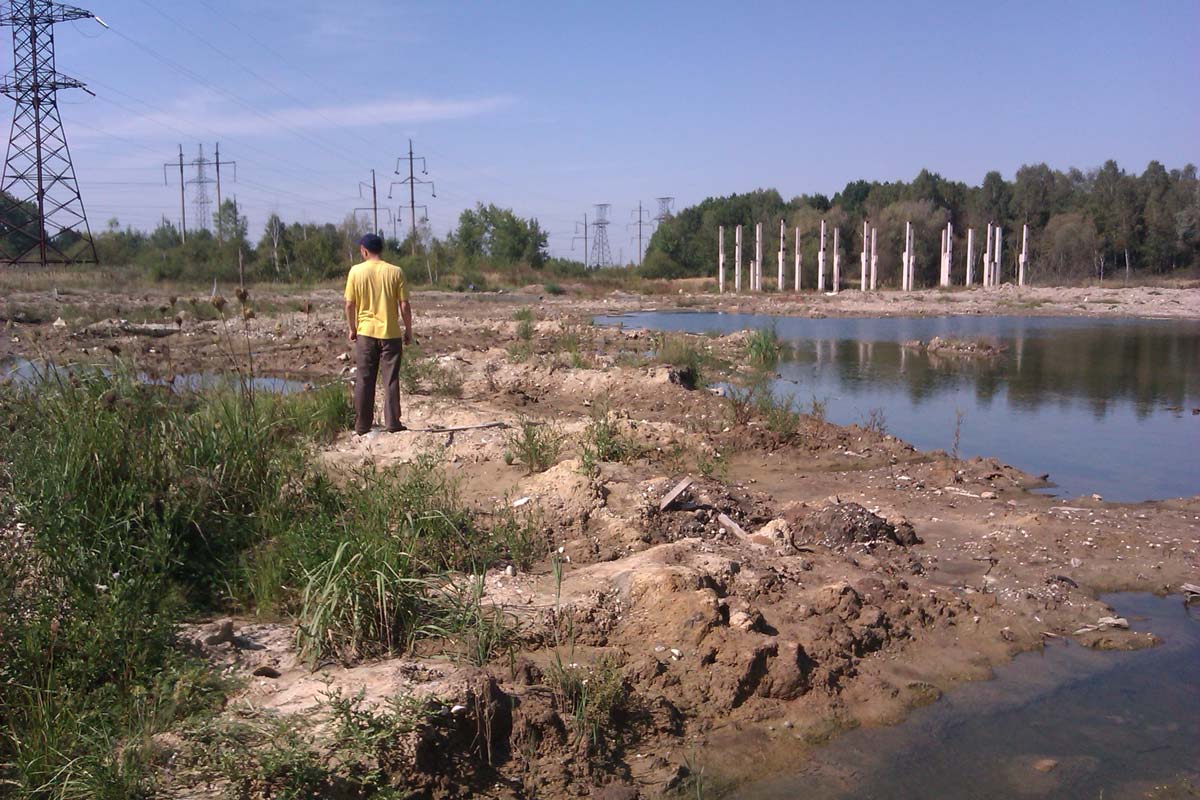 Photo by: Lyubov VelychkoS.I. Group Consort has been named in three criminal cases alleging embezzlement of budget funds in a large scale by the officials of Department of Construction and Architecture of Ivano-Frankivsk regional state administration. While the criminal cases are being investigated, Marchevskiy freely travels from Ukraine to Israel and back.
Photo by: Lyubov VelychkoS.I. Group Consort has been named in three criminal cases alleging embezzlement of budget funds in a large scale by the officials of Department of Construction and Architecture of Ivano-Frankivsk regional state administration. While the criminal cases are being investigated, Marchevskiy freely travels from Ukraine to Israel and back.
Moreover, his company is demanding 294 million hryvnia (US$ 13.8 million) in compensation that the state allegedly owes it.
Marchevskiy warned if the debt is not paid, he may soon return more than 8,000 tons of hazardous waste to Ukraine.
However, the Ministry of Ecology says it is not going to hand over the money.
Despite this, on July 7 the Higher Economic Court in Kyiv ordered that the local authorities in Ivano-Frankivsk pay the company 294 million hryvnia (US$ 13.8 million).
The Israeli company continued to export wastes until late 2014.
According to the Kyiv city administration, in 2013-2014 the company exported nearly 300 tons of hazardous waste from the territory of the Kyiv-based Radical factory.






